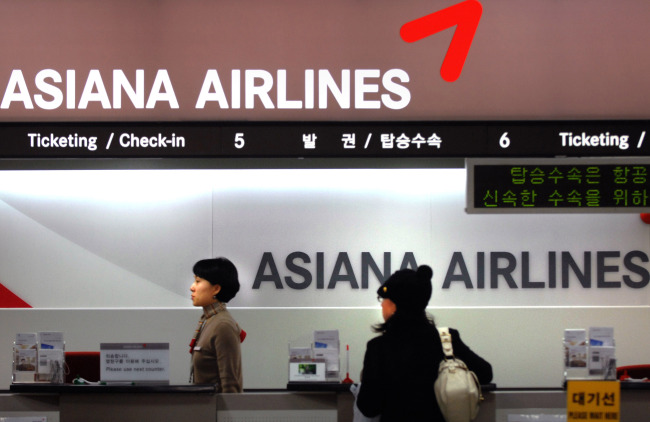Asiana Airlines’ plan to set up its second low-budget carrier within this year is unlikely to be realized as the Middle East respiratory syndrome outbreak has dealt a blow to South Korea’s second-largest carrier, industry sources said Tuesday.
 |
| A customer waits for her tickets at Asiana Airlines Inc. booth at Kimpo Airport in Seoul, South Korea. (Bloomberg) |
“It seems hard for the new budget airline to be established by the end of this year as it’s behind schedule in applying for the transportation business license,” a former Asiana official said.
In March, Asiana gave impetus to plans to launch Air Seoul, its second budget carrier after Air Busan, by appointing Ryu Kwang-hee as the new airline’s chief executive officer and forming a task force for the project.
But as Asiana failed to apply to the Ministry of Land, Infrastructure and Transport for a business license and an air operator certificate by June, industry watchers speculated that the Air Seoul launch would be delayed until 2016. According to a Transport Ministry official, the approval procedures take at least four to six months.
Asiana attributed the delay to the deadly MERS virus, as the airline has faced massive cancellations of flights since the first case was reported in the country in May, experiencing a plunge in passengers in June.
“Applying for an air operator certificate has been postponed as we are currently focusing on recovering flight occupancy rates dropped by the MERS scare,” Im Dae-woong, an Asiana spokesperson said.
According to the data from Asiana Airlines and Korean Air, the total number of passengers on domestic and international flights came to 5.99 million in June, down 10 percent from a year ago.
Earlier this year, the launch of Air Seoul was also hampered by other local carriers’ protests against Asiana Airlines’ move to establish the second budget carrier in March and a flight crash at Hiroshima in Japan, which left 23 passengers with minor injuries in April.
By Park Han-na (hnpark@heraldcorp.com)



